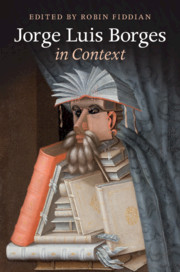Book contents
- Jorge Luis Borges in Context
- Jorge Luis Borges in Context
- Copyright page
- Contents
- Illustrations
- Contributors
- Acknowledgements
- Permissions
- Note on Primary Sources and Editions Used
- Chronology
- Note on Translations and Abbreviations
- Introduction Borges in Context, Context in Borges
- Part I Self, Family, and the Argentine Nation
- Part II The Western Canon, the East, Contexts of Reception
- Chapter 17 Borges and Cervantes
- Chapter 18 Borges’s Shakespeare
- Chapter 19 Borges and the Dialectics of Idealism
- Chapter 20 The English Romantics and Borges
- Chapter 21 Borges and the First Spanish Avant-Garde
- Chapter 22 Borges and James Joyce: Makers of Labyrinths
- Chapter 23 Borges and Kafka
- Chapter 24 Borges and the Bible
- Chapter 25 Borges and Judaism
- Chapter 26 Borges and Buddhism
- Chapter 27 Borges and Persian Literature
- Chapter 28 Borges and the ‘Boom’
- Chapter 29 Argentina and Cuba: The Politics of Reception
- Chapter 30 Borges and Coetzee
- Chapter 31 Borges in Portugal
- Chapter 32 Borges and Italy
- Further Reading
- Index
Chapter 18 - Borges’s Shakespeare
from Part II - The Western Canon, the East, Contexts of Reception
Published online by Cambridge University Press: 16 January 2020
- Jorge Luis Borges in Context
- Jorge Luis Borges in Context
- Copyright page
- Contents
- Illustrations
- Contributors
- Acknowledgements
- Permissions
- Note on Primary Sources and Editions Used
- Chronology
- Note on Translations and Abbreviations
- Introduction Borges in Context, Context in Borges
- Part I Self, Family, and the Argentine Nation
- Part II The Western Canon, the East, Contexts of Reception
- Chapter 17 Borges and Cervantes
- Chapter 18 Borges’s Shakespeare
- Chapter 19 Borges and the Dialectics of Idealism
- Chapter 20 The English Romantics and Borges
- Chapter 21 Borges and the First Spanish Avant-Garde
- Chapter 22 Borges and James Joyce: Makers of Labyrinths
- Chapter 23 Borges and Kafka
- Chapter 24 Borges and the Bible
- Chapter 25 Borges and Judaism
- Chapter 26 Borges and Buddhism
- Chapter 27 Borges and Persian Literature
- Chapter 28 Borges and the ‘Boom’
- Chapter 29 Argentina and Cuba: The Politics of Reception
- Chapter 30 Borges and Coetzee
- Chapter 31 Borges in Portugal
- Chapter 32 Borges and Italy
- Further Reading
- Index
Summary
In Shakespeare, Borges found a precursor of his own philosophical preoccupations with the negation of personal identity and with the transmission of a cultural legacy. ’Everything and Nothing’ (1960) and the later ’A Page on Shakespeare’ (1964) explore the first of these concerns. Compensating somewhat for his sense of nothingness, Shakespeare exploited the roles of actor and playwright to create and impersonate multiple selves. Regarding him as the epitome of reworking and recycling pre-existent stories and plots, Borges exemplifies a flawed approach to Shakespeare’s legacy in the character of Sogel in a late story entitled ’Shakespeare’s Memory’.
- Type
- Chapter
- Information
- Jorge Luis Borges in Context , pp. 149 - 157Publisher: Cambridge University PressPrint publication year: 2020
- 1
- Cited by

